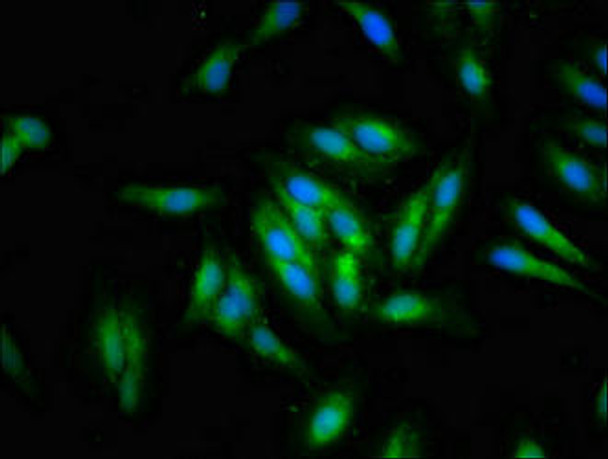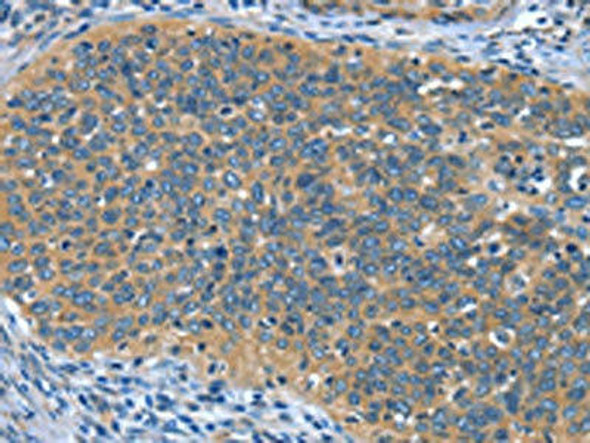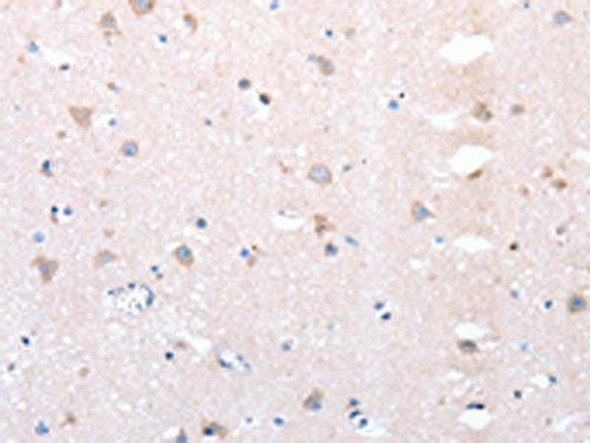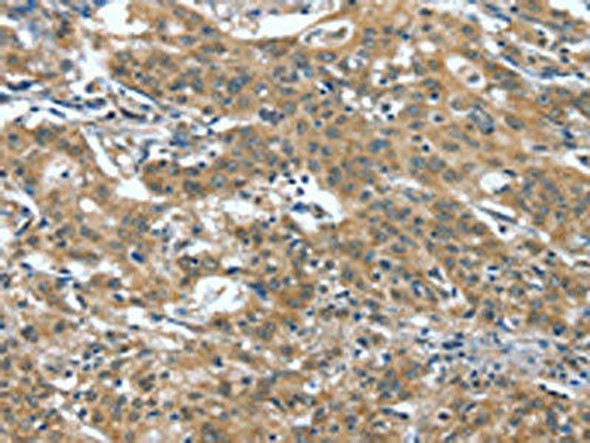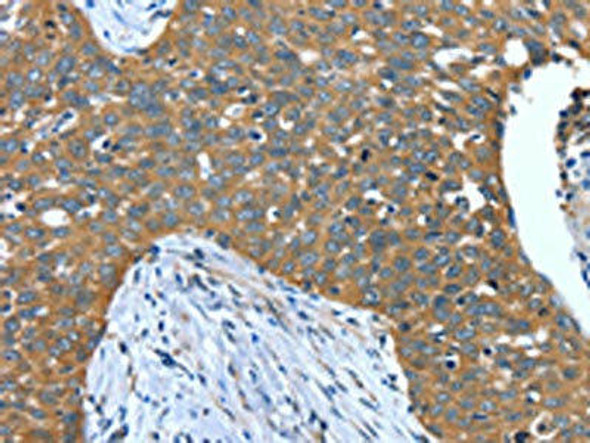Description
DTX1 Antibody (PACO55202)
The DTX1 Polyclonal Antibody (PACO55202) is a valuable tool for researchers studying DTX1, a protein involved in cell signaling pathways. This antibody, produced in rabbits, has been proven to be highly specific for human samples and is suitable for use in Western blot applications. By binding to the DTX1 protein, this antibody enables the detection and analysis of DTX1 in various cell types, making it a versatile tool for research in the fields of cell biology and signaling pathways.DTX1 is a key regulator of Notch signaling, a pathway involved in cell fate determination and development. Dysregulation of Notch signaling has been implicated in various diseases, including cancer and developmental disorders.
Therefore, studying the expression and function of DTX1 is essential for understanding the mechanisms underlying these diseases and developing targeted therapies.In conclusion, the DTX1 Polyclonal Antibody is a valuable resource for researchers interested in investigating the role of DTX1 in cell signaling pathways and its potential implications in disease. Its high specificity and reliability make it a trusted tool for research in the fields of molecular biology, cancer biology, and developmental biology.
| Antibody Name: | DTX1 Antibody (PACO55202) |
| Antibody SKU: | PACO55202 |
| Size: | 50ug |
| Host Species: | Rabbit |
| Tested Applications: | ELISA, IF |
| Recommended Dilutions: | ELISA:1:2000-1:10000, IF:1:50-1:200 |
| Species Reactivity: | Human |
| Immunogen: | Recombinant Human E3 ubiquitin-protein ligase DTX1 protein (261-410AA) |
| Form: | Liquid |
| Storage Buffer: | Preservative: 0.03% Proclin 300 Constituents: 50% Glycerol, 0.01M PBS, pH 7.4 |
| Purification Method: | >95%, Protein G purified |
| Clonality: | Polyclonal |
| Isotype: | IgG |
| Conjugate: | Non-conjugated |
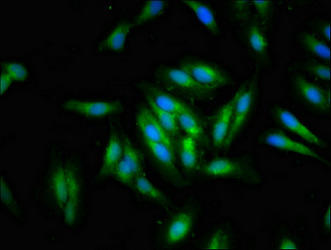 | Immunofluorescent analysis of Hela cells using PACO55202 at dilution of 1:100 and Alexa Fluor 488-congugated AffiniPure Goat Anti-Rabbit IgG(H+L). |
| Background: | Functions as a ubiquitin ligase protein in vivo, mediating ubiquitination and promoting degradation of MEKK1, suggesting that it may regulate the Notch pathway via some ubiquitin ligase activity (By similarity). Regulator of Notch signaling, a signaling pathway involved in cell-cell communications that regulates a broad spectrum of cell-fate determinations. Mainly acts as a positive regulator of Notch, but it also acts as a negative regulator, depending on the developmental and cell context. Mediates the antineural activity of Notch, possibly by inhibiting the transcriptional activation mediated by MATCH1. Involved in neurogenesis, lymphogenesis and myogenesis, and may also be involved in MZB (Marginal zone B) cell differentiation. Promotes B-cell development at the expense of T-cell development, suggesting that it can antagonize NOTCH1. |
| Synonyms: | E3 ubiquitin-protein ligase DTX1 (EC 2.3.2.27) (Protein deltex-1) (Deltex1) (hDTX1) (RING-type E3 ubiquitin transferase DTX1), DTX1 |
| UniProt Protein Function: | DTX1: Functions as an ubiquitin ligase protein in vivo, mediating ubiquitination and promoting degradation of MEKK1, suggesting that it may regulate the Notch pathway via some ubiquitin ligase activity. Regulator of Notch signaling, a signaling pathway involved in cell-cell communications that regulates a broad spectrum of cell-fate determinations. Mainly acts as a positive regulator of Notch, but it also acts as a negative regulator, depending on the developmental and cell context. Mediates the antineural activity of Notch, possibly by inhibiting the transcriptional activation mediated by MATCH1. Involved in neurogenesis, lymphogenesis and myogenesis, and may also be involved in MZB (Marginal zone B) cell differentiation. Promotes B-cell development at the expense of T- cell development, suggesting that it can antagonize NOTCH1. Belongs to the Deltex family. |
| UniProt Protein Details: | Protein type:Ligase; EC 6.3.2.-; Ubiquitin ligase; Ubiquitin conjugating system Chromosomal Location of Human Ortholog: 12q24.13 Cellular Component: cytoplasm; cytosol Molecular Function:Notch binding; protein binding; transcription coactivator activity; ubiquitin protein ligase binding Biological Process: cell surface receptor linked signal transduction; negative regulation of neuron differentiation; Notch signaling pathway; regulation of Notch signaling pathway; transcription from RNA polymerase II promoter |
| NCBI Summary: | Studies in Drosophila have identified this gene as encoding a positive regulator of the Notch-signaling pathway. The human gene encodes a protein of unknown function; however, it may play a role in basic helix-loop-helix transcription factor activity. [provided by RefSeq, Jul 2008] |
| UniProt Code: | Q86Y01 |
| NCBI GenInfo Identifier: | 37077046 |
| NCBI Gene ID: | 1840 |
| NCBI Accession: | Q86Y01.1 |
| UniProt Secondary Accession: | Q86Y01,O60630, Q9BS04, |
| UniProt Related Accession: | Q86Y01 |
| Molecular Weight: | 67,368 Da |
| NCBI Full Name: | E3 ubiquitin-protein ligase DTX1 |
| NCBI Synonym Full Names: | deltex E3 ubiquitin ligase 1 |
| NCBI Official Symbol: | DTX1 |
| NCBI Official Synonym Symbols: | hDx-1 |
| NCBI Protein Information: | E3 ubiquitin-protein ligase DTX1 |
| UniProt Protein Name: | E3 ubiquitin-protein ligase DTX1 |
| UniProt Synonym Protein Names: | Protein deltex-1; Deltex1; hDTX1 |
| Protein Family: | Protein DETOXIFICATION |
| UniProt Gene Name: | DTX1 |
| UniProt Entry Name: | DTX1_HUMAN |

